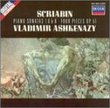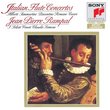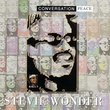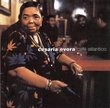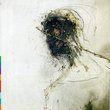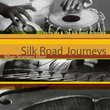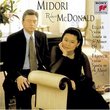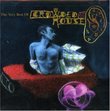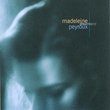| All Artists: Franz Schubert, Emerson String Quartet, Mstislav Rostropovich Title: Franz Schubert: String Quartets D 804 "Rosamunde", D 810 "Death and the Maiden", D 887, D 703 and String Quintet D 956 Members Wishing: 0 Total Copies: 0 Label: Deutsche Grammophon Release Date: 2/9/1999 Album Type: Box set Genre: Classical Styles: Chamber Music, Historical Periods, Classical (c.1770-1830) Number of Discs: 3 SwapaCD Credits: 3 UPC: 028945915128 |
Search - Franz Schubert, Emerson String Quartet, Mstislav Rostropovich :: Franz Schubert: String Quartets D 804 "Rosamunde", D 810 "Death and the Maiden", D 887, D 703 and String Quintet D 956
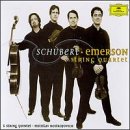 | Franz Schubert, Emerson String Quartet, Mstislav Rostropovich Franz Schubert: String Quartets D 804 "Rosamunde", D 810 "Death and the Maiden", D 887, D 703 and String Quintet D 956 Genre: Classical
|
Larger Image |
CD DetailsSimilarly Requested CDs
|
CD ReviewsSchubert's late chamber masterpieces Alan Lekan | Boulder, CO | 10/29/2005 (4 out of 5 stars) "The strong points of this 3-CD set are: (1) the immeasurably rich compositions from Schubert, (2) the excellent coupling of the last four quartets with the quintet, (3) the above-average Emerson Quartet performance and (4) the superb value from DG. If you are not familiar with Schubert's chamber works, these four quartets and string quintet are very late masterpieces and some of Schubert's most intricate, mature and monumental compositions. These, along with Schubert's late piano sonatas, reveal glimpses into his deep struggles and pain (through the explosive, dissonant outbursts) but also tender moments of joy and repose as well. It seemed in his final year or two that he was emerging into a consumate maturity as a composer - which tragically was cut short by his early death (supposedly due to complications from Syphilis). The quintet is especially magnificant with each movement being as towering as the next. There is no arguing that the Emerson Quartet stands among the finest current quartets around. Whether you gravitate to their particular style and sound is quite a personal matter. Certainly, the Emersons get strong accolades for their late Beethoven and recordings of more modern (and 'edgy') composers. In such bold, purcussive and chromatic music they seem to excel and find their greatest expression. Schubert - while 'edgy' in his own way in these late chamber works - still composed in the somewhat-restrained Vienesse tradition (being born and bread in Vienna himself) although parallels to Beethoven are abundent in the music here. Consequently, Schubert's chamber music has still a strong classical flavor and typical Schubertian lyricism. Like another reviewer mentioned, the Emerson Quartet's style is a bit more "direct" and "sharp" in terms of phrasing, articulations and tonality somewhat. Some call their style "A Manhattan style" - I guess suggesting the directness that people from Manhattan are known for (no offense to New Yorkers). Regardless, the Emerson's style becomes more apparent when comparing with European quartets like the Alban Berg, the Quartetto Italiano and the Quatuor Mosaiques - all of which perform this music with what is often described as a more traditional "Old World Austrian style" (particular the Alban Berg Quartet who hails from Austria). So, while the Emerson's put forth dramatic, precise and interesting readings here, I think at times they "attack" the music too aggressively for its intent and period in history. Schubert was first and foremost a master of melody and lyricism - which does not go away even in his most dissonant and explosive momements. There just seems - at times - an overly-direct expressiveness and tempos that are driven a bit too quickly from the Emersons and a lack of the needed elegance and lyrical smoothness of Schubert's music when called for. But, such things are nuance and not a matter of right or wrong really. However, this quartet dynamic brings out the needed emotive effect in pieces like the potent G-major scherzo movement or the electifying Quartetsalz. Ditto that as well for the great quintet in C major - which a live recording with the legendary cellist, Rostropovich. So, the Emerson's playing here on the whole is impeccably precise and consumately professional so it is more a question whether you like their style nuances as compared to others. Part of this above conclusion may be colored in part by the sound quality here on DG, which I found to be deficient in tone richness and resonant depth. It just sounds stark and dry - lacking the resonant, harmonic fullness and proper sound stage that allow music to "breath" more and sound more expansive and dramatic. But on the positive side, the instrument balance is great and the sound is full in volume and not "hissy" with a close-miked ambiance allowing clear differentiation of instruments if you like that kind of sound. The Quartets who to me best capture these most complex and emotive quartets most fully are the (1) Alban Berg (quartets and especially the quintet), (2) the Quatuor Mosaiques (who play a most expressively and nuanced Rosamunde) (3) Takacs Quartet for Death of the Maiden and Rosumnde and (4) the Quartetto Italiano in especially the G major quartet which is truly staturesque in its harmonic depths). This DG 3-CD set is a fine recording and value - I just don't think it is the music in which this top quartet shines the brightest. I think the others listed above represent Schubert on a higher plane of excellence and more idiomatic to the composition. But, this DG coupling of the last four great quartets plus the monumental string quintet is fairly unique and priced to be the best value out there. Either way, what is most important is to explore these most wonderful chamber masterpieces." Outstanding Fling Clooten | 11/28/1999 (5 out of 5 stars) "The sheer beauty of these quartets (& quintet) leaves me feeling as if no words can come close to fairly describing them. This CD was the first occasion I had to hear the Emersons - I can honestly say that I have never heard any ensemble play with more cohesion. They embody a musical Gaia principle - one living organism through which Schubert speaks. I know I'm a little overboard with the analogy, but that's how much I love these recordings. Highly recommended." Yes, This is Fabulous Dale Chapman | San Ramon, CA USA | 12/04/1999 (5 out of 5 stars) "I don't know about any "gaia principles" (per the review below), but yes...this is fabulous. You get the 3 late quartets, the unfinished movement for quartet ('quartettsatz') and the quintet. In particular, I love the Emerson's performance of the G-major (D 887) quartet. The Allegro Molto Moderato is both nerve-wrackingly agitated and swimmingly melifluous. What a beauty! I must say I prefer the Quatuor Mosaiques performace of the 'Rosamude' quartet, but the Emerson's still do a noble enough job (I just miss Christophe Coin's surging cello). This is a fabulous package, and a bargain at $30 for 3 discs. Buy this, and then also get the Quatuor Mosaiques disc with the D 804 quartet."
|

 Track Listings (8) - Disc #1
Track Listings (8) - Disc #1